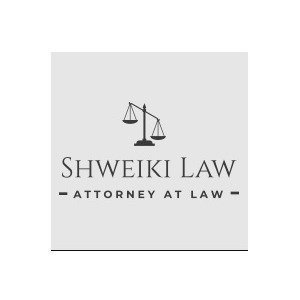Best Conveyancing Lawyers in Palestine
Share your needs with us, get contacted by law firms.
Free. Takes 2 min.
Free Guide to Hiring a Real Estate Lawyer
Or refine your search by selecting a city:
List of the best lawyers in Palestine

Istikamah For Advocates And Legal Services - استقامة للمحاماة والخدمات القانونية
15 minutes Free ConsultationAbout Conveyancing Law in Palestine
Conveyancing in Palestine is the legal process of transferring ownership of real property from one party to another. This typically involves the sale or purchase of residential or commercial real estate. The process ensures the legal transfer is conducted appropriately, protecting the rights of all parties. Conveyancing in Palestine is influenced by a unique blend of Ottoman, British Mandate, Jordanian, Egyptian, and Palestinian laws due to the region's complex historical and political background. Understanding this legal landscape is essential for anyone involved in property transactions.
Why You May Need a Lawyer
People may require legal assistance with conveyancing for various reasons. Common situations include buying or selling property, transferring land ownership as a result of inheritance, addressing disputes over property boundaries or titles, or seeking to register a newly built property with the relevant authorities. A lawyer can help ensure that the transaction is legally sound, handle negotiations on your behalf, check for any outstanding debts or encumbrances on the property, prepare and review contracts, and manage the administrative procedures required by local authorities. Legal errors or oversights in the conveyancing process can lead to substantial financial and legal complications, so expert advice is highly recommended.
Local Laws Overview
Conveyancing law in Palestine is characterized by an intricate mix of legal systems. Key aspects include the necessity for thorough title verification, registration requirements, and strict observance of land classifications. The Land Registry (also known as the Tabu) and various other governmental bodies play crucial roles in verifying and registering property transactions. Legal procedures may vary depending on the region, and it is important to be aware of military orders and regulations, especially in the West Bank. Disputes may arise due to incomplete registrations, outdated land records, or issues regarding inherited land. Particular attention should be paid to documents proving ownership, the legal capacity of the involved parties, and compliance with local planning and construction regulations.
Frequently Asked Questions
What is conveyancing?
Conveyancing is the process of legally transferring property ownership from one person to another. It involves preparing, verifying, and executing all necessary documents to make the property transaction valid under Palestinian law.
Do I need a lawyer for conveyancing in Palestine?
While not always legally required, hiring a lawyer is highly recommended to avoid mistakes, legal disputes, and ensure all legal requirements are met.
What documents are needed for conveyancing?
The main documents include the property title deed, evidence of payment of taxes and fees, identification documents for buyers and sellers, and any prior agreements or inheritance-related paperwork.
How is property ownership verified?
Ownership is typically verified through the Land Registry (Tabu) or relevant local authority records, which confirm the legal owner and any encumbrances or restrictions on the property.
What are some common issues in Palestinian conveyancing?
Common issues include unclear or disputed land titles, missing or outdated documentation, unresolved inheritance claims, and disagreements over property boundaries.
Are there taxes or fees involved?
Yes, buyers and sellers must generally pay taxes and administrative fees during the transfer of property. The amount may vary depending on the type and location of the property.
How long does the conveyancing process take?
The timeline can vary widely from a few weeks to several months, depending on the complexity of the transaction, the completeness of documentation, and the efficiency of government procedures.
Can foreigners own property in Palestine?
Some restrictions apply to foreign ownership, especially in certain areas or for particular land types. Legal advice is essential to determine what is permitted for non-citizens.
What happens if a dispute arises during conveyancing?
Disputes are generally resolved through negotiation, mediation, or by filing a case in the Palestinian courts. Legal representation is important in resolving these disputes effectively.
Is inheritance handled as part of conveyancing?
Yes, inheritance often plays a significant role in property transfers in Palestine. The relevant inheritance laws must be observed, and appropriate legal steps must be taken to transfer ownership to heirs.
Additional Resources
Those seeking further information should consider the following resources:
- Palestinian Land Authority and Land Registry offices - for guidance on land registration and documentation.
- Local Bar Associations - for finding qualified conveyancing lawyers.
- Municipal planning departments - for information on building permits and property classification.
- Civil Affairs Offices - for administrative support with document processing and official approvals.
- NGOs specializing in housing and land rights - for advice related to legal rights and dispute resolution.
Next Steps
If you require legal assistance with conveyancing, start by gathering all relevant documents related to your property and any prior transactions. Contact a qualified local lawyer who specializes in property and conveyancing law. Arrange a consultation to discuss your specific needs and any potential obstacles. Your lawyer can review your situation, identify any issues, and guide you through the necessary legal and administrative procedures. Staying informed and seeking professional advice early in the process helps ensure smoother and more secure property transactions in Palestine.
Lawzana helps you find the best lawyers and law firms in Palestine through a curated and pre-screened list of qualified legal professionals. Our platform offers rankings and detailed profiles of attorneys and law firms, allowing you to compare based on practice areas, including Conveyancing, experience, and client feedback.
Each profile includes a description of the firm's areas of practice, client reviews, team members and partners, year of establishment, spoken languages, office locations, contact information, social media presence, and any published articles or resources. Most firms on our platform speak English and are experienced in both local and international legal matters.
Get a quote from top-rated law firms in Palestine — quickly, securely, and without unnecessary hassle.
Disclaimer:
The information provided on this page is for general informational purposes only and does not constitute legal advice. While we strive to ensure the accuracy and relevance of the content, legal information may change over time, and interpretations of the law can vary. You should always consult with a qualified legal professional for advice specific to your situation.
We disclaim all liability for actions taken or not taken based on the content of this page. If you believe any information is incorrect or outdated, please contact us, and we will review and update it where appropriate.
Browse conveyancing law firms by city in Palestine
Refine your search by selecting a city.















